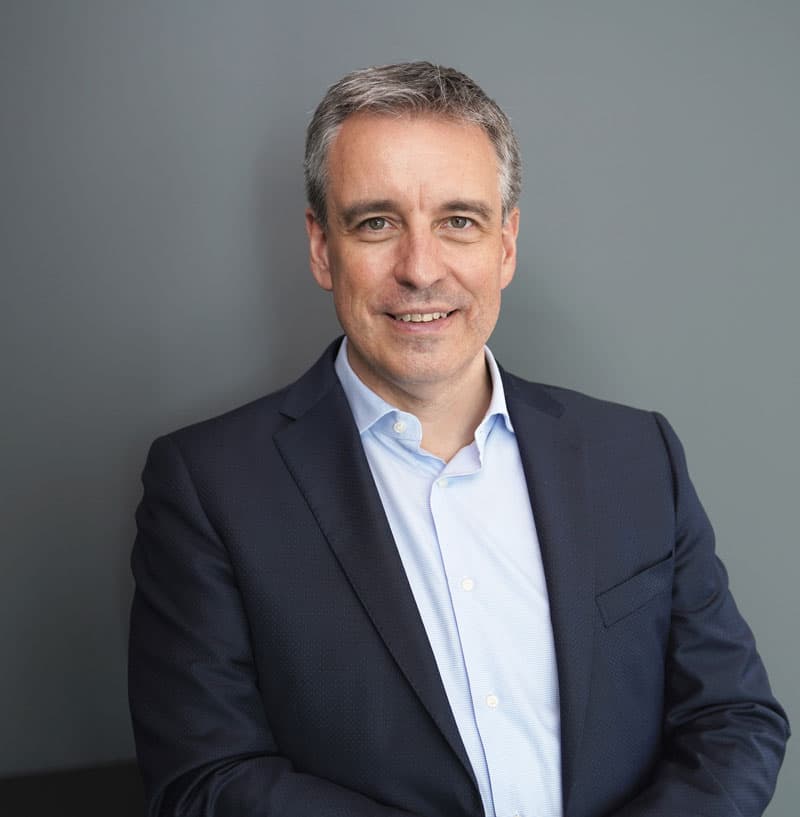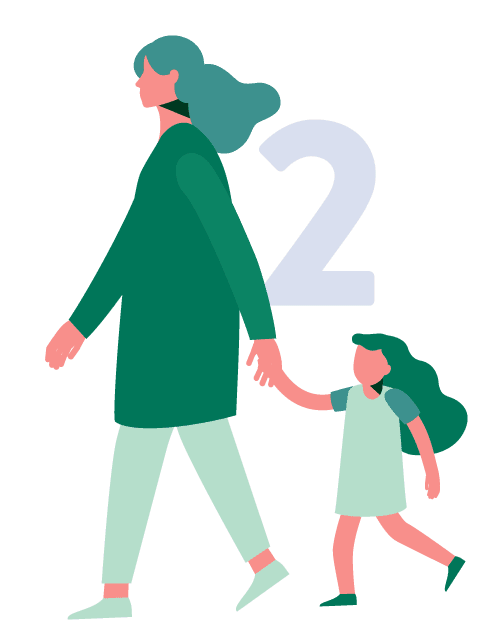

CLAUDE MEISCH
Minister of Education, Children and Youth
Dear parents,
The national representation of pupils’ parents is a young and dynamic body. Created by the Law of 1 August 2018, it was elected for the first time in February 2020, following the local elections in autumn 2019.
Many of you stood for election and then became actively involved, both at school and national level. This commitment deserves my gratitude and now serves as an example to other parents.
During these two and a half years, I have appreciated the quality of the discussions with the members of the national representation and the points of view they have shared with me on the subjects and projects which are important to us. During the COVID-19 health crisis in particular, I found this consultation, which has become more frequent, a great support.
Your ideas, your experience and your enthusiasm are valuable. Whether your child has just started school or is already well advanced in his or her school career, you have expertise as parents to share. I invite you to become candidates and join the bodies where we discuss the education we want for our children.
"Whether your child has just started school or is already well advanced in his or her school career, you have expertise as parents to share"
This site is for everyone interested in parent participation in school life and in particular for parents elected as parent representatives or wishing to become parent representatives.

Getting involved at the local level
The role of pupils’ parents at primary school level
The partnership between teachers and the parents of pupils is rooted in Article 47 of the Law of 6 February 2009 on the organisation of primary education. It states that the parents’ first partners are the class teacher (titulaire de la classe) and the educational team (équipe pédagogique). Parents and teachers regularly hold individual exchanges and information and consultation meetings are organised.
The school will invite you in October 2022 to apply to become a parents’ representative.
The legal basis for the representation of parents is to be found in Articles 48 et seq. of the above-mentioned Law.
Term of office: three years. The term of office of the current representatives ends this year. Elections will be held in October 2022.
Tasks of representatives: When convened by the chair of the school committee (comité d’école) and whenever they so request, the parents’ representatives meet with the school committee to
- discuss, and if necessary, amend and supplement the school organisation proposal and the school development plan prepared by the school committee;
- organise joint meetings and events of the school partners;
- formulate, with the involvement of the pupils, proposals on all issues relating to the organisation of school life.
Number of meetings: there are at least three meetings each school year.
At the municipal level, the partnership between school authorities, school staff and pupils’ parents is carried out through the municipal school board (commission scolaire communale), which is an advisory body of the municipal council. According to Article 50, the school board has the following tasks:
- To give its opinion to the municipal council on the school organisation and the school development plan and make proposals in this respect;
- To monitor the implementation of the school organisation and the school development plan;
- To promote extracurricular support measures by encouraging information, exchanges and consultation between parents, staff working in schools and services and organisations taking charge of pupils outside normal school hours;
- To issue an opinion on the reports drawn up by the Department for the Coordination of Educational and Technological Research and Innovation (SCRIPT) and to bring to the attention of the Board of the Mayor and Aldermen (Collège des bourgmestre et échevins) any matter it considers useful or detrimental to the interests of primary education;
- To give an opinion on the proposals concerning the schools’ budgets;
- To participate in the elaboration of the design, construction or alteration of school buildings.
The role of pupils’ parents at secondary school level
Each secondary school (lycée) has a parents’ committee, elected each year in autumn. Thus, the outgoing committee convenes the general meeting of parents of pupils enrolled in the secondary school before 1 November in the current school year. If you wish to become a parents’ representative, you should contact the committee before the meeting. The meeting determines the composition and the arrangements for the election of the parents’ committee. The committee delegates the parents’ representatives to the school’s education council (conseil d’éducation).
According to Article 35 of the Law on the organisation of secondary schools, as amended, the parents’ committee has the following responsibilities:
- To represent the pupils’ parents vis-à-vis the school management (direction) and the committees formed respectively by the secondary school conference (conférence du lycée) and the pupils;
- To inform parents about all issues related to teaching in the secondary school;
- To prepare position papers for its representatives on the education council;
- To organise cultural and social activities and formulate all proposals concerning the organisation of teaching and pupils’ work within the school.
The headmaster (directeur) meets the parents’ committee whenever the latter so requests.
Each secondary school has a disciplinary board, on which a representative of the parents sits. The disciplinary board is called upon to rule on contraventions which may result in the expulsion of the pupil. In addition to the parents’ representative, the council is also composed of two members of the school management as well as three teachers and a member of the school psycho-social and support service.
The parents’ representative on the disciplinary council is appointed each year by the parents’ meeting.
Each secondary school has an education council composed of nine members: the headmaster, four delegates from the teachers’ committee, two delegates from the pupils’ committee and two delegates from the parents’ committee.
Parents of pupils attending a special education and counselling centre (centre de compétences) are represented on the committees of parents of children or young people with special educational needs set up for each centre.
All the parents will be informed in October or November 2022 about the elections of the parents’ representative.
The responsibilities of these committees are defined in Article 39 of the Law of 20 July 2018 establishing education and counselling centres for specialised psycho-pedagogy to promote inclusion in schools:
- To represent the parents of children or young people with special educational needs supported by the centre vis-à-vis the management;
- To submit proposals to the headmaster on all matters concerning the partnership within the centre;
- To participate in the organisation of cultural and social activities.
The members of the parents’ committee are elected by and from among the parents of children or young people with special educational needs cared for at the centre.
National representation of pupils’ parents
The national representation of pupils’ parents is rooted in the Law of 1 August 2018 creating a national representation of parents.
It is composed of 12 members, 6 of whom represent parents of secondary school pupils, 4 parents of primary school pupils and 2 parents of pupils attending a special education and counselling centre.
The national parents’ representation aims to strengthen the culture of cooperation between the School and pupils’ parents by creating a democratically elected representation which takes on the role of parents’ spokesperson and advisor to the Minister of National Education.
It may issue opinions on drafts and proposals for laws or educational projects, formulate proposals concerning school life and teaching, or, more broadly, express an opinion on any issues affecting the interests of parents and pupils.
It also appoints 2 representatives to the national school board (commission scolaire nationale) for primary education, 4 representatives to the Higher Council of National Education (Conseil supérieur de l’Éducation nationale) and 1 representative to the guidance forum (forum orientation).
- The term of office of the national representatives is 3 years.
- Members of the national representation are entitled to 8 days’ leave.
- To be eligible as a representative of a sectoral representation, the candidate must be a parent of one or more pupils, enrolled at that time in the relevant sector. He/she must also be a parent representative in the school, secondary school or special education and counselling centre attended by his/her child.
- When a parent representative no longer has a child attending school in the sector which he/she represents, he/she terminates his/her mandate as a representative at the end of the current school year.
- The replacement of sectoral and national representatives is carried out in accordance with the ranking order of candidates during the last elections of representatives.
- Parents of one and the same child may not simultaneously be members of the same sectoral or national representation. A parent may not be a member of more than one sectoral representation.
The elections take place in two stages:
- At the sectoral level
- For the parent representatives of pupils in primary education:
The election is held by region. The headmasters of the fifteen regions bring together the parents’ representatives elected in the primary schools in their region.
Each regional assembly elects two sectoral representatives. Each private and international or European school (public or private) also appoints a sectoral representative.
- For representatives of parents of pupils in secondary education:
The election is held by secondary school. The parents’ committee of each secondary school elects two sectoral representatives from among its members. Each private and international or European (public and private) educational institution elects a sectoral representative.
- For parents of pupils with special needs:
Each pupil supported by a special education and counselling centre remains enrolled in his/her regular school (primary school or secondary school).
The parents of these pupils may therefore run for the position of sectoral representative either through the school where their child is enrolled or at the level of the special education and counselling centre which the child attends.
In principle, two sectoral representatives are elected in each special education and counselling centre.
2. At the national level
The Minister convenes the sectoral representations, each of which appoints its own representatives.
Primary school
The local elections (elections of parent representatives in each school) will take place in October 2022.
The sectoral elections (each primary education management has two representatives elected from among all the parents’ representatives of the region’s schools) will take place in January 2023.
Each private school appoints a sectoral representative and communicates the name of the representative to the Ministry before the end of 2022 (parents@men.lu).
The national elections (the sectoral representatives elect the 4 national representatives for primary education) will take place in February 2023.
Secondary school
Each secondary school elects its parents’ committee before 1 November. Each parents’ committee has 2 sectoral representatives elected. Each private secondary school has a sectoral representative elected. The committees communicate the names of the elected representatives to the Ministry before the end of 2020 (parents@men.lu)
In February 2023 all sectoral representatives will be called upon to elect their 6 national representatives for secondary education.
Special education and counselling centres
Each special education and counselling centre has two sectoral representatives elected before the end of 2022. The centres provide the names of the elected representatives to the Ministry before the end of 2022 (parents@men.lu).
In February 2023 all the sectoral representatives will be called upon to elect their 2 national representatives for the special education and counselling centres.
Primary school
The local elections (elections of parent representatives in each school) will take place in October 2022.
The sectoral elections (each primary education management has two representatives elected from among all the parents’ representatives of the region’s schools) will take place in January 2023.
Each private school appoints a sectoral representative and communicates the name of the representative to the Ministry before the end of 2022 (elteren@men.lu).
The national elections (the sectoral representatives elect the 4 national representatives for primary education) will take place in February 2023.
Secondary school
Each secondary school elects its parents’ committee before 1 November. Each parents’ committee has 2 sectoral representatives elected. Each private secondary school has a sectoral representative elected. The committees communicate the names of the elected representatives to the Ministry before the end of 2022 (elteren@men.lu)
In February 2023 all sectoral representatives will be called upon to elect their 6 national representatives for secondary education.
Special education and counselling centres
Each special education and counselling centre has two sectoral representatives elected before the end of 2022. The centres provide the names of the elected representatives to the Ministry before the end of 2022 (elteren@men.lu).
In February 2022 all the sectoral representatives will be called upon to elect their 2 national representatives for the special education and counselling centres.
In the interest of continuous school development, it brings to the Minister’s attention innovative educational practices. It gives its opinion on all questions referred to it by the Minister. In particular, it is consulted on questions of principle and general interest concerning primary education.
It issues an opinion on new teaching material to be used in the classroom. In particular, it finds whether the material is in conformity with the provisions of the study plan for primary education.
It is composed as follows:
- four members to be appointed by the Minister;
- a member to be appointed by the Minister responsible for the Family;
- a member of secondary school staff to be appointed by the Minister;
- the president of the “collège des directeurs” for primary education;
- a regional director to be elected by and from among his peers;
- four primary school teachers to be elected by and from among their peers;
- a representative of the municipal authorities to be appointed by the Minister on the proposal of the Union of Luxembourg Cities and Municipalities (Syndicat des Villes et Communes Luxembourgeoises);
- two parents of pupils appointed by the Minister at the proposal of the national parents’ representation.
Le Conseil supérieur de l’Éducation nationale (CSEN), organe consultatif, se prononce soit à la demande du ministre, soit de sa propre initiative, sur toutes les questions ayant trait à l’éducation nationale et plus particulièrement les grandes orientations du système éducatif. Il comprend 36 membres représentant les parents, élèves et étudiants ; le personnel enseignant ; les autorités en rapport avec l’école (collège des directeurs de l’enseignement fondamental, collèges des directeurs de l’enseignement secondaire, communes, cultes reconnus, etc.) ; le monde économique, social, associatif et culturel.
La représentation nationale des parents d’élèves désigne les 4 représentants des parents d’élèves au conseil supérieur de l’éducation.

Getting involved at the national level
Information

Who can become a parent representative?
Anyone with a child enrolled in primary, secondary (private or public) education or in a special education and counselling centre or a state class in Luxembourg can become a local, sectoral or national parent representative.
Can both parents be representatives?
Yes and no. Article 8, paragraph 4, stipulates that “Parents of the same child may not be members of the same sectoral or national representation at the same time. A parent may not be a member of more than one sectoral representation.”
However, it is not excluded that the parents of the same child may both be representatives at the local level. If the couple has two children, one can also be a sectoral representative for the primary level and the other for the secondary level.
My child is supported by a special education and counselling centre. Where can I stand to be a representative?
When your child is cared for by a special education and counselling centre, it is possible that he/she will remain enrolled in a primary school. In this case, you have the choice of becoming a representative at the primary school in which your child is enrolled or at the special education and counselling centre, even if it takes care of your child on an occasional basis only.
What happens if a primary education management, a secondary school or a special education and counselling centre fails to appoint its sectoral representatives?
The Law does not provide for “forced candidacy”. If, owing to a lack of candidates, a regional management, secondary school or special education and counselling centre is unable to appoint its two sectoral representatives who may subsequently become national representatives, local representatives will be less well informed about the activities of the national representation.
How will representatives be able to communicate with each other?
As soon as the national elections are over, the Ministry of Education will set up an electronic communication platform through which local, sectoral and national representatives can easily communicate with each other and share interesting information. National representatives may also conduct surveys to gather the opinions of the other local and sectoral representatives.
Why are there only 4 national representatives for primary education and 6 for secondary education?
The complexity of secondary education (number of divisions and sections, possible paths including vocational training, etc.) can make taking a position more tedious. A larger number of representatives therefore allows for better account to be taken of this complexity and for a better distribution of the workload.
The Law also applies to private institutions: what were the reasons for this choice?
A number of political decisions also have an impact on parents of pupils in private schools and this is why their voices must be heard. Parents whose pupils are in private education may have a different approach to educational topics and their opinion is certainly an enrichment.
What is the role of parent associations?
There are already a large number of parent associations (associations de parents d’élèves) in secondary schools and primary schools. Often these associations are in charge of organising social and cultural events. Some members of associations may also be elected as parents’ representatives within the school, the secondary school or the special education and counselling centre. However, a parent does not need to be a member of the association in order to become a local, sectoral or national representative.
